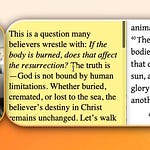The Big Question
Few questions stir more discussion among Christians and skeptics alike than this one: Did God really create the heavens and the earth in six literal days, as Genesis 1 describes? Some argue the creation account is poetic or symbolic, while others hold firmly to a plain, historical reading of the text. To answer this question fairly, we need to examine the biblical testimony, the meaning of the Hebrew text, and the theological significance of God’s creative work.
What Does Genesis Actually Say?
Genesis opens with these powerful words:
“In the beginning, God created the heavens and the earth.” — Genesis 1:1
From there, the chapter outlines six days of creative activity. Each day ends with the phrase, “And there was evening and there was morning—the first day,” (Genesis 1:5). This repeated refrain is not accidental. It emphasizes a sequential pattern of time—evening followed by morning, a typical way of describing a literal day in ancient Hebrew culture.
The Hebrew word for “day” used in Genesis 1 is “yom.” In most contexts, “yom” refers to a normal, 24-hour day—especially when paired with numbers (“first day,” “second day,” etc.). While “yom” can sometimes mean a longer period, the way it is used in Genesis strongly supports the idea of literal, ordinary days.
The Testimony of the Rest of Scripture
Genesis is not the only place that speaks about the length of creation. In Exodus 20:11, God Himself uses the creation account as the foundation for the Sabbath command:
“For in six days the Lord made heaven and earth, the sea, and all that is in them, and rested the seventh day. Therefore the Lord blessed the Sabbath day and made it holy.”
This verse is crucial. If the six days of creation were long ages or merely symbolic, then the parallel to the six-day workweek followed by one day of rest would lose its force. God’s command to Israel assumes that His creation week was a pattern of literal days.
Similarly, the New Testament writers often affirm the historical accuracy of Genesis. For example, Jesus Himself refers to the beginning of creation when teaching about marriage:
“But from the beginning of creation, ‘God made them male and female.’” — Mark 10:6
Christ’s words assume a real, historical creation—man and woman present from the start, not after billions of years of evolutionary processes.
The Theological Weight of Literal Days
Believing in a six-day creation is not just about arguing science or language; it’s about understanding God’s character and His purposes.
God’s Power
The six-day creation demonstrates that God does not need long ages to accomplish His work. “By the word of the Lord the heavens were made, and by the breath of His mouth all their host” (Psalm 33:6). Creation was a display of divine power, not a slow unfolding dependent on chance.God’s Order
The structured sequence of six days reveals a God of order and intentionality. Each day builds upon the previous, culminating in humanity—made in God’s image (Genesis 1:26–27).God’s Rest
The seventh day, a literal day of rest, points forward to a greater reality. Hebrews 4 connects God’s Sabbath rest with the eternal rest believers enter through Christ. The creation week thus becomes a prophetic pattern woven into God’s redemptive plan.
Objections and Considerations
Some Christians suggest that the “days” of Genesis might represent long ages, citing 2 Peter 3:8: “With the Lord one day is as a thousand years, and a thousand years as one day.” But notice—Peter’s point is not to redefine “day,” but to show God’s transcendence over time. The verse highlights God’s patience, not the length of creation days.
Others argue that Genesis 1 is a poetic or symbolic narrative. While the chapter certainly carries grandeur and rhythm, its style is more historical than poetic. Unlike the Psalms or Proverbs, it presents a chronological sequence and specific details that read like history, not metaphor.
Why It Matters Today
In our culture, the question of origins is more than academic. If we lose confidence in the opening chapters of Scripture, it weakens the foundation for the rest of the Bible. Genesis establishes truths about God as Creator, humanity’s identity, the entrance of sin, and the promise of redemption. If Genesis is only symbolic, when does history in the Bible truly begin?
Furthermore, believing in six literal days affirms the authority of Scripture. God did not stutter in His Word. If He says He created in six days, our task is not to adjust His Word to fit modern theories, but to trust that His Word is true—even when it challenges human wisdom.
Conclusion: Trusting the Creator
So, did God really create the world in six literal days? According to the plain reading of Scripture, supported by the testimony of both Old and New Testaments, the answer is yes.
The six days of creation reflect God’s mighty power, His divine order, and His sovereign purpose. They provide the foundation for our work and rest, our understanding of humanity, and our trust in His Word.
As believers, we echo the psalmist:
“By the word of the Lord the heavens were made, and by the breath of His mouth all their host… For He spoke, and it came to be; He commanded, and it stood firm.” — Psalm 33:6, 9
In the end, the six days of creation are not merely about the age of the earth, but about the authority of the God who created it.
Want to Learn Beyond the Newsletter & Partner With Us?
We offer multiple ways to partner with us on our Subscribe Page and Help this Ministry Grow. Gain Full Access to All Courses, Commentaries, Podcast Episodes, and Ad Free Videos (🤝 Only a FEW DOLLARS A MONTH DONATION)+ other great benefits.










